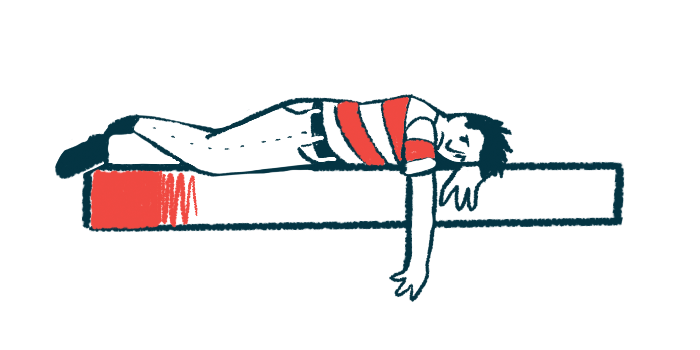Fatigue predicts worse health-related quality of life in RRMS
Researchers analyzed data from 2 U.S. National Health and Wellness Surveys
Written by |

Fatigue is a significant predictor of worse health-related quality of life in adults with relapsing-remitting multiple sclerosis (RRMS), a study reports.
High levels of fatigue were significantly linked with worse physical and mental health, including cognitive impairments, depression, and anxiety.
The findings suggest “that minimizing fatigue and related symptoms may improve the physical and emotional well-being of patients,” the researchers wrote in “Exploring humanistic burden of fatigue in adults with multiple sclerosis: an analysis of US National Health and Wellness Survey data,” which was published in BMC Neurology.
Fatigue is one of the most common symptoms of MS, affecting about 80% of patients, and also has a more severe impact than with the general population. It correlates with a worse health-related quality of life (HRQoL), including disability.
Its impact on physical and mental health, particularly in RRMS, remains poorly understood, leading researchers at Janssen Scientific Affairs and colleagues at Cerner Enviza to analyze data from two U.S. National Health and Wellness Surveys (NHWS) from 2017 and 2019. The surveys collect data annually from about 75,000 respondents. The final analysis included data from 498 age- and sex-matched adults with RRMS and 1,494 adults without MS, who served as controls.
High and low fatigue
Among the RRMS patients, 123 had high fatigue and 375 had low fatigue, as assessed by the 5-item Modified Fatigue Impact Scale (MFIS-5), which evaluates the impact of MS-related fatigue on cognitive, physical, and psychosocial functioning based on five questions. Each question is scored from 0 to 4. A score below 15 means low fatigue. A higher score means high fatigue.
RRMS patients with high fatigue were statistically less likely to be employed full-time than those with low fatigue (17.89% vs. 30.67%) and more likely to be on long-term disability (38.21% vs. 14.13%). More patients with low fatigue reported an annual income higher than $75,000 than the high fatigue group (35.73% vs. 21.14%).
No differences were seen between high and low fatigue groups regarding using MS medications. Overall treatment satisfaction was significantly higher among low fatigue patients, however. Those with high fatigue were significantly more likely to switch their medications due to side effects (46.81% vs. 27.39%).
Assessing health-related quality of life
HRQoL was assessed using the 36-Item Short Form Health Survey (SF-36) and the Euroqol-5 Dimensions-5 Levels (EQ-5D-5L) questionnaire. The physical component summary (PCS) and the mental component summary (MCS) scores from the SF-36 were analyzed, whereas the EQ-5D-5L evaluates mobility, self-care, usual activities, levels of pain or discomfort, and anxiety or depression.
The overall HRQoL of RRMS patients, both low- and high-fatigued, was significantly worse than controls. Comparing the two patient groups, those with high fatigue had significantly worse (lower) MCS and PCS scores, and worse overall scores in the SF-36 and EQ-5D-5L.
Depression also was markedly more severe in RRMS patients with high fatigue, as indicated by higher scores in the Patient Health Questionnaire-9 (PHQ-9), the mean difference being 12.64 versus 5.30. The control group had a mean score of 4.85. PHQ-9 scores range from 0 to 27, with higher scores indicating more severe depression.
Moderate to severe depression affected significantly more patients with high fatigue (67.48%) than low fatigue (17.06%) and controls (17.48%).
Anxiety also differed significantly between the groups, with 39.03% of patients with high fatigue having moderate to severe anxiety compared to 13.92% of controls and 9.87% of low fatigue participants, as assessed by the Generalized Anxiety Disorder-7 scale.
A multivariate analysis — based on the relationship between several variables — revealed fatigue was a significant predictor of poor HRQoL across all measures, including physical and mental health, depression, anxiety, and overall treatment satisfaction. The analysis also found a link between high fatigue and MS-related cognitive dysfunction, as assessed by the Perceived Deficits Questionnaire-5 that looks at attention, memory, and planning/organization.
Moderate to severe depression was 10.45 times more likely and moderate to severe anxiety 6.47 times more likely to occur in RRMS participants with high fatigue.
The findings “establish the profound effect of level of fatigue on HRQoL among patients with RRMS and demonstrate that worse outcomes are proportional to the level of fatigue,” the researchers wrote. “Considering the complex and multifactorial nature of MS-related fatigue, a systematic approach involving early diagnosis may help to improve HRQoL of patients with MS.”
